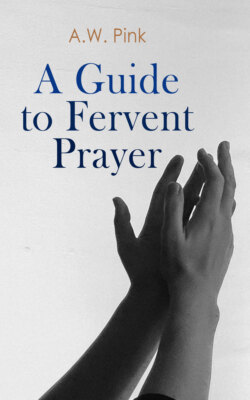Читать книгу A Guide to Fervent Prayer - A.W. Pink - Страница 29
На сайте Литреса книга снята с продажи.
Christ’s Petitions for His Own Deliverance
ОглавлениеIt is very blessed to learn from the Psalms—where much light, not given in the New Testament, is cast upon the heart exercises of the Mediator—that Christ supplicated God for deliverance from the tomb. In Psalm 88 (the prophetic subject matter of which is the passion of the Lord Jesus) we find Him saying, "Let my prayer come before thee: incline thine ear unto my cry; For my soul is full of troubles: and my life draweth nigh unto the grave:" (vv. 2, 3). Since the transgressions of His people had been imputed to Him, those "troubles" were the sorrows and anguish that He experienced when the wages that were due to the sins of His people were inflicted and executed upon Him. He went on to exclaim to God, "Thou hast laid me in the lowest pit, in darkness, in the deeps. Thy wrath lieth hard upon me, and thou hast afflicted me with all thy waves" (vv. 6, 7). There we are granted an insight into what the Savior felt in His soul under the stroke of God, as He endured all that was contained in the Father’s just and holy curse upon sin. He could not have been brought into a lower state. He was in total darkness, the sun for a season refusing to shine upon Him, as God hid His face from Him. The sufferings of Christ’s soul were tantamount to "the second death." He suffered the whole of what was for Him, as the God-man, the equivalent of an eternity in hell.
The smitten Redeemer went on to say, "I am shut up, and I cannot come forth" (v. 8). None but the Judge could lawfully deliver Him. "Wilt thou shew wonders to the dead? shall the dead arise and praise thee?" (v. 10). In his remarkable exposition, S. E. Pierce declared:
Those questions contain the most powerful plea Christ Himself could urge before the Father for His own emerging out of His present state of suffering and for His resurrection from the power of death. "Shall the dead arise and praise Thee?" Yet in Me Thou wilt show wonders in raising My body from the grave, or the salvation of Thine elect cannot be completed, nor Thy glory in the same fully shine forth. Thy wonders cannot be declared; the elect dead cannot rise again and praise Thee, as they must, but on the footing of My being raised up.
"But unto Thee have I cried, O LORD" (v. 13). What light this Psalm casts upon these words of the apostle concerning Christ: "Who in the days of his flesh, when he had offered up prayers and supplications with strong crying and tears unto him that was able to save him from death, and was heard. . . " (Heb. 5:7). In the prophetic language of Psalm 2:8, God the Father says to His Son, "Ask of Me, and I shall give thee the heathen for thine inheritance, and the uttermost parts of the earth for thy possession." (ital. mine) In like manner, our Lord first cried for His deliverance from the prison of the tomb, and then the Father "brought him forth" in answer to His cry. Behold how perfectly the Son of man is conformed to our utter dependence on God. He, too, though the Sinless One, must pray for those blessings that God had already promised Him!
